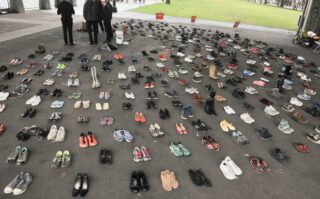
(Photos: Jonathan Maus/BikePortland)
Late Thursday night someone died while using 122nd Avenue. They were the 46th person whose life ended while traveling on a Portland road so far this year, putting us on the same grim pace as 2019 despite a major reduction in travel due to the pandemic.
There have been four fatal crashes in a one mile stretch of 122nd Avenue in the past year alone. In 2018 I attended a press conference marking the completion of new crossings and other updates to the notoriously deadly street. Standing just one block from one of this year’s deaths, Portland Bureau of Transportation Commissioner Chloe Eudaly, PBOT Director Chris Warner, and other transportation bigwigs gave glowing speeches about their dedication to Vision Zero. Eudaly said the recent changes they made were an example of “transportation done right” and how she wasn’t willing to accept the constant carnage on 122nd.
But even on that day just over two years ago it was clear the measures taken by PBOT would not be enough. “It will take much more to tame the wide and fast 122nd Avenue,” I wrote in my recap of that event, “Even with the crowds and cameras at the newly updated NE Stanton intersection this morning, I still saw close calls and aggressive driving.” The good news is PBOT isn’t done with 122nd. In January they won a $4.5 million grant from Metro (via federal funds) to make more changes that should be coming soon.
Advertisement
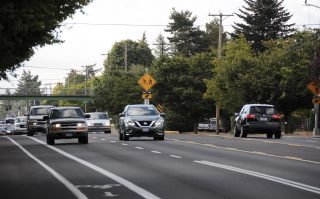
But will the changes to 122nd be aggressive enough to stop the bleeding? If PBOT’s past performance is any indication, I’m afraid they won’t be.
It’s simple: If we want fewer people to die on our roads, we must make more dramatic changes to street designs that will force people to drive less and drive slower. Incremental improvements fail because the threat evolves much faster than the steps we take to mitigate it.
This Sunday is the annual World Day of Remembrance for Road Traffic Victims. The event was started by United Nations decree in 2005 and it has helped spark a global movement to make roads safer. This morning PBOT issued a statement about it. “We are honoring World Day of Remembrance through message boards. Look for them on Portland-area streets this weekend.”
Message boards.
My son Seamus died ten years ago today. This is the last photo of him – snapped on a flip phone by my husband at our neighborhood park, 2 hrs before they were struck by a careless driver in a crosswalk. He sent it w/ a text that said, "He knows 'uphill' and 'downhill' now!" 1/8 pic.twitter.com/8IeQ3W36Sk
— Michelle DuBarry (@DuBarryPie) November 9, 2020
This past Monday, north Portland resident Michelle DuBarry shared a heartbreaking Twitter thread about her 22-month-old son who was hit by a driver and killed while walking across North Lombard and Interstate in 2010. “Cars are the #1 killer of children in the U.S. – I wish we could muster more outrage at this fact,” she wrote. “The intersection remains a literal death trap.”
People drive so fast and recklessly through places like Interstate and Lombard — and 122nd and Burnside where that person died last night — that they won’t even see a message board, much less a human in their path.
It’s important to remember people we’ve lost. Each one is a tragedy. But let’s also remember that a commitment to safe traffic won’t work if we continue to make safe choices.
— Jonathan Maus: (503) 706-8804, @jonathan_maus on Twitter and jonathan@bikeportland.org
— Get our headlines delivered to your inbox.
— Support this independent community media outlet with a one-time contribution or monthly subscription.



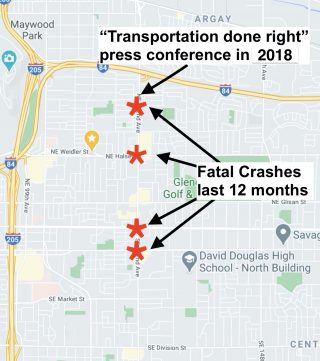
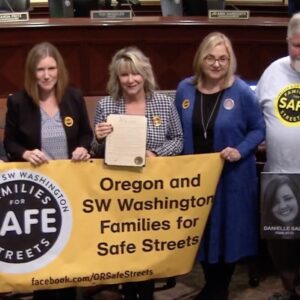
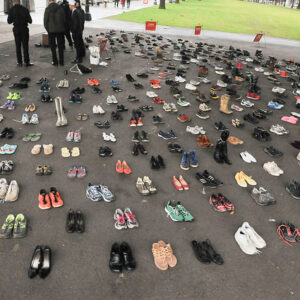

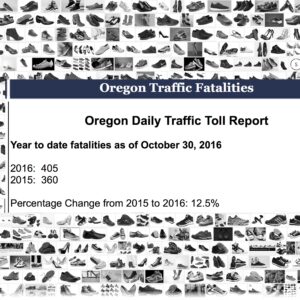
Thanks for reading.
BikePortland has served this community with independent community journalism since 2005. We rely on subscriptions from readers like you to survive. Your financial support is vital in keeping this valuable resource alive and well.
Please subscribe today to strengthen and expand our work.
Eudaly came out here and cut a ribbon and everything! Who needs enforcement or cameras?
We have the research to design roads and enact policy to prevent almost all road deaths. We know how to solve this problem. Many other places in the world already have zero deaths. PBOT continues to design roads that prioritize car capacity, speed, and parking. Until this changes, we will see no difference in safety.
Like where? Fewer deaths, maybe, but zero?
Oslo
Helsinki
And a big long list.
Neither are quite at zero, but I’ll give full credit for the answer.
If you move the slider to maximum (500,000 people or more), only Goteborg Sweden shows up.
Nice resource though. Thank you for the link.
Those places also use enforcement. Serious enforcement. Serious penalties. And rigorous licensing protocols.
Hey JM, I think your picture showing where the press conference was is mislabeled “2008” instead of “2018”.
I just wonder how we can get someone with political courage in charge of PBOT. Eudaly was either ineffective at getting a cultural change or didn’t want one. Making our roads safer is cheap. The expensive part is trying to figure out how to make them “safe” while maintaining highway speeds through urban areas.
Thanks for catching that. Fixed it.
As for Eudaly and PBOT. I think she actually had a lot of political courage. She established a bus priority program, said lots of stuff about how bad driving is, she was poised to do big things for biking (in Feb, then Covid hit), and she just backed Hardesty on the most courageous thing I’ve seen at council for a looong time (the police cuts).
But yeah, courage alone isn’t enough. It takes getting the politics right. And while I love some things about Eudaly as a politician, I also don’t think she’s a great politician in other important ways. To get this transportation stuff done, we’ve got get the issue itself further up the ladder of priority. That is very difficult to do in a town where 1000s of people are living in tents, the police are brutalizing innocent people, there’s no affordable places to live, and so on. It’s also difficult to make progress on this transportation stuff when we don’t really have a large and powerful advocacy group pushing on it. I don’t think enough people realize what a hole we have in our local transportation reform ecosystem at the moment because The Street Trust is basically MIA… and has been for years really. This is a complicated discussion and it’s too simplistic IMO to put all the blame at PBOT’s feet. They are doing amazing work given the constraints they face and we should never expect city agency staff to save us.
JM, what is your proposed solution for 122nd?
NACTO design guide: Boulevard.
or thoroughfare:
https://nacto.org/publication/urban-street-design-guide/streets/downtown-thoroughfare/
protected intersection:
https://nacto.org/publication/dont-give-up-at-the-intersection/
122nd, and its intersecting streets, has at most 90 feet of public right-of-way, so the Boulevard treatment above, even if the money was available, is not actually physically able to be done. A slimmer version based on the thoroughfare model you list next, with parking sometimes on one side, sometimes the other, sometimes none at all, should be doable, except then you run up against an unfortunate tradition in American street design in that a street design must be uniform throughout, with no variation district to district. PBOT is an anal organization that strictly adheres to this tradition.
The thoroughfare design listed above includes parking-protected bike lanes, which generally only work if people are already inclined to park on the street, and curbside bike lanes with very few or no curb cuts. Most of the parking spaces along 122nd never have parked cars in them, as the cars are parked on off-street lots served by the frequent curb cuts. But there are a few areas, usually near apartment complexes, that people do park on the street at night.
I agree with you 100% about protected intersections, except again 122nd doesn’t have quite the space, and has far greater traffic, than the Dutch designers had in mind. Still, with modifications, it should be doable.
Would you mind if EP took all the funding for the Rose Quarter I-5 expansion, once it’s been cancelled, and apply it towards 122nd?
HA! Yes, please.
Oh I’m not a traffic engineer or planner. That’s not my job. I think we are lucky to have so many smart, caring people at PBOT. They are awesome, but we need to create a political/public environment where they can be less constrained by traditions and what’s “feasible” and get them to act on what’s possible.
In general though, we need to reduce the width by a lot. We need sharper turning radii, more impediments and traffic calming. More traffic cameras. Much wider and more protected spaces for cycling, and so on.
And perhaps no turn on red? One less hazard that a person crossing has to watch for. Lower speeds for cars approaching the intersection.
You’ve said several times that Eudaly was great on bikes, or, here, that she was “poised to do big things”. What was in the offing?
The BTA/Street Trust is an object lesson in how agencies can co opt their critics. They’re not missing; they’re busy cashing their checks.
I agree about PBOT staff generally doing herculean work down in the trenches, Jonathan, but I do think that it is time for Roger Geller to resign or be let go. Awkward, I’m sure, but Roger’s been the Bicycle Coordinator for 20 years now and last time I checked it’s not a lifetime position. Ordinarily, I might be inclined to lean on the importance of “institutional memory” here but we’re nowhere near where we need to be in 2020 and some of the failures must fall on him. He’s a great person but IMHO has been increasingly ineffective over the years as the city has backslid on its oversold “platinum” reputation. Meanwhile, folks like him have traveled the world giving keynote speeches, presumably on the taxpayer’s dime. It feels like we desperately need new energy (younger, more visionary, less white, less to lose in general) amongst PBOT higher-ups – I’ll be very curious to see which commish gets PBOT next year and whether or not they’ll have the wherewithal to be an effective overseer of the agency. Too bad we’re stuck with Wheeler/PBA in the mayor’s role.
Jonathan,
Interesting how you continue to stir up hatred towards the police even on an unrelated topic (“ ….the police are brutalizing innocent people” ). Your generalized anti-police statements won’t move us forward in making our public safety system safer for all. Yes, there are “bad” police officers but there are also many excellent ones who go to work daily to make our community safer and help their fellow citizens. Your “ACAB” type comments are trendy right now in the far left cocoon but it is entrenching people in their respective corners. The police are here to stay in one form or another. We need to make friends not enemies if we want to have a chance of moving ahead with public safety reform.
Hi Javier, that sentence of mine about police you reference is a fact. Everything in your comment is your projections about what you assume my beliefs to be.
I feel it would be more accurate if it said “some police are brutalizing innocent people” but I get it. For you, your statement is fact. Cleary this is your forum and you even labeled this entry as “Opinion” so of course you are free to express your opinion as you see fit. You support a much more confrontational dialectic than I do. Is there a role for this? Maybe so. Perhaps it can get the “ships of change” in motion. On the police reform issue though I feel the ship is actually sailing. Now is the time to shift away from the “ACAB” mentality and work collaboratively (with all stakeholders) to improve our public safety. Just my opinion.
Thanks for listening.
Regards,
Javier
Yes I agree that adding the word “some” in statements like that is often a good idea (and actually something I’ve thought about in the past as a way to make points without too broad of a brush).
And I agree that we must always have an eye on the direction of the ship and take advantage of opportunities to work together to change its course. Fortunately I believe that’s already happening on the police issue. We just saw a very healthy debate at council where even the policing-skeptical side was very far from the position of “ACAB”.
Thanks for commenting. I appreciate having your perspective here.
It would be equally true (and equally misleading) to state “cyclists menace pedestrians”. Would you accept that statement without objection?
Cyclists menacing pedestrians is a defect. Cops using force is a feature.
Both beside the point and wrong.
Well, we’ve tried the no enforcement strategy and that hasn’t moved us toward Vision Zero.
Maybe we could try more automated enforcement with speed cameras, red light cameras, and crosswalk enforcement cameras. There would need to be some legislative changes, so I guess that won’t happen.
Sickening.
The biggest peeve I have with most transportation departments, PBOT included, is they delay making costly improvements in poor and/or very dangerous districts, especially when they already have the funding. By delaying a project, there’s that amount of more time for the bodies to pile up, for people’s lives to be permanently altered.
Why the delay? Typically it’s because the local DOT has already spent the money years ago on another completely unrelated project, so they siphon the cash to pay it off – it’s a lot like a pyramid scheme, except with public funding. As neighborhood association members in East Portland say, the money for East Portland was spent in the Pearl District (and in most cases it actually was – the advantage of serving on the PBOT Budget Advisory Committee is we could follow the money in detail.) Only ODOT would actually follow through with projects on time and by design.
But what’s ‘fun’ is to list the creative excuses you get from these agencies:
– The project needed to be redesigned for Vision Zero
– We are waiting for another grant
– The Feds sequestered our funding
– We didn’t get grant approval, so we are applying for another one
– The neighborhood didn’t want it (from a meeting 19 years previously)
What excuses have you heard?
Huge traffic signs are a major distraction. People will be reading the sign instead of watching where they’re driving.
If the city was serious about Vision Zero then they would redesign every road that has a fatality, and they’d do it soon after the crash.
People are dying and they’re not doing anything to stop it.
They are redesigning the roads, all the time. It’s just that they aren’t implementing any of those designs.
If the city had enough money to rebuild every street that had a crash, we could accomplish a lot of things.
How much do YOU want to pay to make this happen? How about your neighbors?
Drunk and distracted drivers have been a major menace to me this past year. Just a couple weeks ago I was proceeding south on 122nd across the intersection with Division. The light had been green for me for a while and would continue to remain green for a while after I passed. I was going maybe 20 when a woman in her 20’s decided to turn right on red in front of me from the THIRD lane from the curb. Division has 4 lanes heading east at 122nd. The first lane is the right turn lane, the second and third are straight only lanes and then the fourth lane is the left turn lane. So from the lane next to the left turn lane, she pulls out ON A RED LIGHT and in order to avoid the car also trying to make a right on red in the first lane, she has to pull wide into the second lane on 122nd. I hit the brakes locking up my rear wheel and fully expected to make impact with her driver’s door while skidding but she tightened up her turn and sped up opening the gap and missed me by mere inches. Her window was open and I actually thought I would end up inside her vehicle. When she turned her head to look at me during this encounter, her eyes half closed, I knew that she was intoxicated. Unfortunately, in my moment of shock and subsequent surprise that we did NOT impact, I failed to get a license plate and she proceeded to speed away, weaving through traffic south on 122nd so I could not catch up. This incident was eerily similar to when I got hit by a driver making a right on red from Burnside to 181st as I was going north on 181st through that intersection just back in March. But if this woman misjudged and there was a car approaching the intersection from behind me, I would have been stuck in a collision between TWO CARS!
When I’m stopped at a traffic light, I watch drivers making left hand turns across the intersection. It always frustrates me to see them look down at their phones WHILE TURNING! Like you can’t complete the damn turn without looking at your phone? You’re going through an INTERSECTION! which itself is a higher risk maneuver than just going straight down the road. I also see drivers look down at their phones approaching a traffic light. They’re not fully stopped yet and their eyes are off the road already. If the car in front of them brakes harder than when they looked away, then there’s going to be a crash. Why do this?
Personally, I would like to see the following changes:
– MUCH more traffic enforcement to target DUI and distracted driving!
– eliminating right turns on red within the metro area
– MANY red light cameras to the point where you just expect intersections to have them
I think these three changes would improve driver habits and, after repeat violations, remove habitually risky drivers from roads which would lead to positive outcomes, not just for cyclists and pedestrians, but other drivers as well.
Finally, I am fully on board these changes as a driver myself.
I second your suggestions! It seems like every third driver is on their phone. I very nearly got sideswiped by a young woman in a white VW who passed me on Madison. She had both hand on her phone texting like mad with her thumbs, one wheel fully in the bike lane THAT I WAS USING!